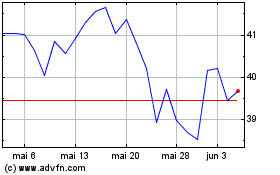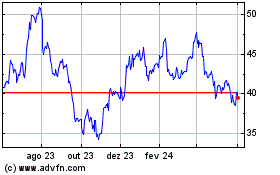By Hannah Karp
Many Las Vegas-area residents are hoping that the opening of the
new 20,000-seat T-Mobile Arena on Wednesday portends the arrival of
the city's first major-league sports team -- an odd absence in a
flashy town that prides itself on entertainment.
Nearly as improbable, that team could be a member of the
National Hockey League, which says it is weighing whether to base a
new franchise in the desert city. Despite the uncertainty, about
13,000 people already have committed to buying season tickets.
Anschutz Entertainment Group and MGM Resorts International,
however, didn't count on a pro sports league when they partnered to
start constructing the $375 million arena two years ago in a former
commercial area on the Strip between the New York-New York and
Monte Carlo hotels and casinos that formerly housed MGM
offices.
Instead, MGM says the arena development is expected to generate
more than $900 million a year for the local economy even without an
anchor tenant.
The O2, AEG's arena in London, which has no resident sports
team, sold more tickets than any other similar venue world-wide
last year, according to concert-industry publication Pollstar.
Major sports leagues have long steered clear of Las Vegas to
avoid association with gamblers. The stigma, however, has faded as
area's economy has grown beyond gambling. Nongaming draws such as
hotels, high-end dining, trendy nightclubs and spas generated 58.4%
of revenue in Clark County last year, while gambling generated
41.6% of revenues, according to the Las Vegas Convention and
Visitors Authority.
The NHL's Los Angeles Kings, owned by AEG, began staging
preseason games in Las Vegas nearly two decades ago, while the
National Basketball Association hosted its All-Star Game there for
the first time in 2007.
The T-Mobile Arena -- the area's first new arena in 20 years --
has so far booked more than 70 events, including this week's
opening concerts by a recently reunited Guns N' Roses, and it
expects to book 30 more by the end of the year. T-Mobile has signed
a multiyear, multimillion-dollar deal with the developers.
The new venue features a nightclub at the top level that would
hold up to 800 people, with triangular decks cantilevered over the
stage for bird's-eye concert views. Should a team decide to call
the arena home, it also has state-of-the-art locker rooms. Workers,
however, are holding off painting them until June, when the NHL is
expected to make a decision.
MGM also is spending $100 million to construct a
desert-landscape park and 2-acre commercial zone called Toshiba
Plaza around the arena, with shops, hotels, restaurants and a
5,000-seat theater that the companies hope will enliven the
area.
Team or no team, AEG Chief Executive Dan Beckerman said in a
recent interview, "the financial model works either way."
Las Vegas Mayor Carolyn Goodman has been rooting for a
major-league team for years, and expects the arena to have a
positive impact on the city and generate additional business, Jace
Radke, a city spokesman, said Monday. The Strip is located in the
town of Paradise, Nev., adjacent to Las Vegas, which both are
located in Clark County. Officials there didn't respond to a
request for comment.
AEG pioneered a similar approach in 2005 when it started
building its own "entertainment district" around its Staples Center
arena in then-desolate downtown Los Angeles. The sleek surrounding
plaza, known as L.A. Live, has helped breathe life into the
once-gritty neighborhood, with hotels, apartment buildings,
restaurants and theaters. One difference: Two NBA teams and one NHL
team call Staples home.
The closely held, 15-year-old AEG, which has its headquarters in
L.A. Live, is building similar entertainment districts around its
arenas in London and Berlin, helping its revenue grow by 30% and
profits by 35% in the past three years, according to industry
executives.
"Suddenly you had a vibrant area of a city, brought back from
the dead," said Tom Wilson, president and CEO of Olympia
Entertainment, which is developing a similar 50-block zone known as
"District Detroit" around the future home of hockey's Detroit Red
Wings. "It's all about putting feet on the ground."
AEG has been eyeing the Las Vegas area for years, but its first
attempt to crack the market a decade ago went south as the global
financial crisis began. Several months after announcing its arena
plans at a news conference in 2007, AEG pulled out of the
venture.
About three years ago the company tried again with MGM, which
owns two of Las Vegas's old arenas, including the 16,800-seat MGM
Grand Garden Arena inside its 22-year-old namesake casino. MGM knew
that several of its competitors were looking to open a bigger,
splashier venue than its own, and it resolved to beat them to the
punch, said MGM Resorts President Bill Hornbuckle.
When Bill Foley -- a billionaire businessman and hockey buff who
lives part time in Las Vegas -- learned about the arena plan, he
quickly launched a bid to lure the NHL. Mr. Foley, who will have an
equity stake in the arena if he wins the team, said it was
relatively easy to get 13,000 season-ticket commitments, given the
area's nearly 2 million-plus population, its wealth, its lack of a
professional sport team, and the large number of transplants from
chillier climates.
Mark Davis, owner of the NFL's Oakland Raiders, has been
publicly exploring the idea of moving his team to Las Vegas, which
wouldn't violate league rules. However, NFL relocations must be
approved by 24 of the league's 32 members, and the proximity to
legal gambling would be a factor that team owners would "have to
understand," NFL Commissioner Roger Goodell said at a recent news
conference.
An NBA spokesman said "expansion is not currently on our
agenda," though former NBA player and developer Jackie Robinson is
hoping to bring an NBA franchise to his own 23,000-seat All Net
Resort and Arena. Demolition of this property -- which formerly was
the site of a theme park -- about 5 miles away from the T-Mobile
Arena began a few weeks ago. Construction is expected to be
completed in 30 to 36 months, he said.
Gambling-related issues have been a concern for Major League
Baseball, but the league hasn't studied the viability of the Las
Vegas market in recent years. Only one club -- the Montreal Expos,
which moved to Washington, D.C., in 2005 and became the Washington
Nationals -- has relocated since 1972. The league hasn't expanded
since 1998.
(END) Dow Jones Newswires
April 04, 2016 20:03 ET (00:03 GMT)
Copyright (c) 2016 Dow Jones & Company, Inc.
MGM Resorts (NYSE:MGM)
Gráfico Histórico do Ativo
De Jun 2024 até Jul 2024

MGM Resorts (NYSE:MGM)
Gráfico Histórico do Ativo
De Jul 2023 até Jul 2024
